
What To Do Within a Few Days
Updated: August 18, 2023
Once you have taken care of the urgent tasks and decisions, there are many other tasks that you should move on to. After you have decided on the wake, funeral, and disposal of remains, it is time to plan and arrange them. In order to make plans, arrange for, and pay for these, you have to locate certain documents and ensure the executor is involved.
- The Last Will and Testament plus any attachments will have information about many of your loved one’s wishes, such as caretakers for dependents, and property that needs to be attended to.
- Advance Directives, such as Final Instructions, Disposition of Remains Authorization, Healthcare Proxy, and/or Designated Agent forms will most likely have details about your loved one’s preferences for their remains, and who is responsible for carrying them out.
- Certain documents, such as a funeral trust or contract for a prepaid funeral, will inform you about handling the cost of these services.
- A life insurance and/or final expense insurance policy may provide other financial resources to offset costs.
- To prevent identity theft:
- Call these three credit agencies and run a final credit report on them.
- Put a fraud alert on their Social Security number.
- Keep their primary credit cards and drivers’ license with you.
- Punch a hole in the driver’s license and passport.

There are other tasks that need to be done soon to protect your loved one’s estate, such as discontinuing mail, notifying the local newspaper, and doing a thorough examination and survey of their property. Families of veterans may want to contact the VA to see what help they can offer.
Who to Notify
Family and friends
There are family and friends to contact that will need to know so they can have the opportunity to attend any wake, funeral, or burial service that’s been planned. Your loved one may have had a list of their names and contact information. Others, such as employers, will need to know to make their own plans.
In this age of connectivity, it is difficult for news to not travel fast, so most of your extended family and friends may already know but you should contact them directly to make sure.
- Notify close friends and extended family that you or your designated assistant haven’t heard from.
- Make a list of as many people as you can and cross them off as you go.
- If your loved one or you did not make a list, you may be able to find contact information through email accounts, mobile phone contacts list, Facebook friends list, personal telephone books, etc.
- You can use many different methods to spread the word.
- Direct contact with a phone call, text, or email may be best for those closest to you.
- An online funeral announcement is often the easiest way to share event details with other friends and family.
- For people who may not use the internet regularly, you can send a paper funeral announcement or arrange for them to be called and informed.
- You can provide details in an obituary in your and/or your loved one’s local paper.
Once a date and time have been set for the service, share the details with those on your contact list and have them spread the word further. Include an address to send cards, flowers or donations.
Executor of your loved one’s estate
If you are not the executor of your loved one’s will, you will need to notify them. They will be required to do many of the tasks, such as getting the will, accessing other records, dealing with finances, and settling the estate. They will probably need to set up an estate bank account for expenses.
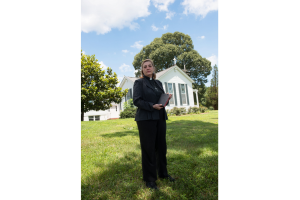 Clergy or other spiritual leaders
Clergy or other spiritual leaders
If you have not already, contact any religious leaders who can provide spiritual support and/or will be involved in ceremonies.
Employers, military units, and volunteer organizations
There may be others that depend on your loved one who will need to be informed.
- Employers may be expecting your loved one to arrive to perform their job, so it is a courtesy to inform them before your loved one would be due to return for work. It could be a good time to ask employers about pay owed, accumulated vacation or earned time, benefits, and life insurance through the company.
- If necessary, contact any other organization that would note their absence such as a union, political board, volunteer group, or fraternal organization.
Veterans Affairs (VA), if applicable
Many additional services and options may be available for military veterans through the VA. A range of benefits can assist you and help you make final decisions about your loved one’s service.
- You may be able to get financial or other assistance with the funeral, burial plot, or other benefits.
- You can find details about options on the U.S. Department of Veterans Affairs website.
- You can call Veterans Affairs at 1-800-827-1000 or your local veterans agency, often included in local government listings.
- You can use this downloadable VA Funeral Arrangements form (PDF) to get started.
- You can inquire about veterans survivor benefits.
Post Office
Mail accumulating in your loved one’s mailbox, front porch, or post office box will attract attention. The knowledge that the residence is unoccupied puts the property at risk for theft or vandalization.
- Stop delivery of mail to your loved one’s residence or post office box.
- Initially you will want to provide them with forwarding information to you or another designated person, if necessary, until you can stop the mail at the sources. Their mail can inform you about subscriptions, creditors, and other accounts that need to be looked into or canceled.
 The local newspaper
The local newspaper
Like the mail, accumulating newspapers is another sign that their residence is unoccupied. Stop delivery before this happens.
If you want an obituary or death notice printed, it will usually be in the local newspaper. Death notices and obituaries can have varying amounts of information; the information you include is entirely up to you.
- Obituaries are articles written by a newspaper’s staff offering a brief biography of your loved one based on the information you provide.
- Death notices are paid announcements in a newspaper that are typically written by relatives or friends. They are usually brief and provide the full name of your loved one and details of the funeral service, as well as where donations can be made.
- The basic information usually includes:
- Maiden name or nickname;
- Date and location of death;
- Cause of death (optional);
- Names of surviving family members (optional);
- Details of the funeral or memorial service (public or private); if public this will include date, time, and location of service; and/or
- Name of charity to which donations should be made.
- Additional information in an obituary or death notice may include:
- Date and place of birth;
- Names of parents;
- Date and place of marriage, and name of spouse;
- Names of children and grandchildren;
- Educational history, including schools attended and degrees or honors received;
- Military service, including any honors or awards received;
- Employment history, including positions held, awards received, or special achievements;
- Membership in organizations, including religious, cultural, civic, or fraternal;
- Special accomplishments;
- Hobbies and interests; and/or
- Personality and character of the person who died.
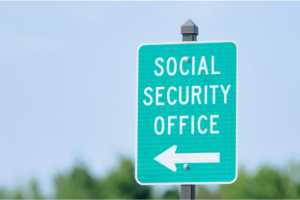 The Social Security Office
The Social Security Office
Your loved one becomes ineligible for Social Security benefits as soon as they die. The Social Security Administration (SSA) recommends that you notify them as soon as possible after your loved ones death.
- If your loved one was receiving benefits, the benefits must stop to avoid overpayments that will require repayment. The payment received for the month of their death will need to be returned. Social Security will then issue a new payment adjusted to account for the date of death.
- Your funeral director may have already notified the SSA; find out if this is the case.
- You should also contact SSA yourself. You can reach them by phone at 1-800-772-1213.
- You may be able to apply to Social Security for survivor benefits.
- As a surviving spouse legally married for at least nine months, with or without dependents, you should ask about your eligibility for increased personal benefits.
- Ask about a one-time payment of a $255 survivor benefit.
- This policy may also apply to same-sex partners if they can show that they meet either of these criteria.
- You would have been married at the time of your partner’s death if state law hadn’t prevented you from doing so.
- You have been married for a longer period before the death of your spouse if state law hadn’t prevented you from marrying sooner.
Visit the Social Security website to learn more about their process and find any forms that you may be required to fill out.
Saying Goodbye
 Once your loved one’s body is in the appropriate place and your support system is established, you have a few days to take the next steps. This will include planning the final goodbye which involves contacting those beyond immediate family, decisions about ways to honor, celebrate, and remember your loved one, and arranging their final resting place.
Once your loved one’s body is in the appropriate place and your support system is established, you have a few days to take the next steps. This will include planning the final goodbye which involves contacting those beyond immediate family, decisions about ways to honor, celebrate, and remember your loved one, and arranging their final resting place.
This process could take as much as a week or more, so it is important to take this into consideration when making plans. For example, embalming is usually required if burial or cremation will not take place within a week of death.
These decisions should reflect your loved one’s wishes. Although, even if they are expressed in a document, compliance is not legally required in more than half of states. In addition to reflecting their wishes, there are many ways you can personalize funerals and burials to reflect their life, personality, and beliefs. There will be practical considerations, such as cost and availability.
Honoring Your Loved Ones
Almost all families will have some type of service or ceremony to honor their loved one and provide an opportunity for family and friends to say goodbye. These events are an important part of the mourning process. The recognition from the community and the emotional support from well-wishers help the family cope with the loss of their loved one.
In some cases, arrangements may have already been made. If not, make them according to what your loved one would want and what you can realistically afford.
Planning Ahead
If your loved one has recently died, you will not be at your best and decisions can be difficult. You will be faced with the distressing task of planning and paying for funeral and burial (cemetery) or cremation costs.
- It will be a costly time that may require you to make financial decisions you’re not prepared for when money from your loved one’s private estate will not be reliably available if they only used a will.
- You may be in a vulnerable state and could fall victim to emotional appeals for add-ons or packages that you neither want or need, but will allegedly show more respect for your loved one.
- Because of this, it is vital that you take the time to research all the details, make up your mind about the details before talking to the funeral director, and stick to your decisions despite offers for additions.
You can avoid this emotional decision-making process by you and your loved one planning and possibly paying for these expenses in advance of your loved one’s death, sometimes even before they are ill, although prepayment has many hazards.
- Start with research into the options available to you in your location and their costs.
- Use this information to budget for funeral and burial (cemetery) or cremation costs.
- Refer to the Funeral Rule to learn your rights.
 The major advantages of planning ahead is the peace of mind that you will not have to face these decisions when the time comes and that you have funds available to pay for it, leading to less anxiety and stress in an already difficult time.
The major advantages of planning ahead is the peace of mind that you will not have to face these decisions when the time comes and that you have funds available to pay for it, leading to less anxiety and stress in an already difficult time.
- You have direct and detailed input from your loved one about what they wish and the amount they want to spend. This can prevent you from hearing things like, “they would have wanted this” or “this would make them more comfortable.”
- There will be much more time to do research, visit different facilities, and compare prices of items and services.
- You will be making decisions under less emotional circumstances. You can be more objective and less susceptible to sales pressure tactics.
- Having money to put aside to pay expenses or having them already paid prevents you from needing to take loans, arrange finance plans, raid savings, or sell assets.
- Many families opt to commit to a funeral home or crematorium and pay for these services in advance. All states allow for these prepaid plans.
As with all purchases it is important to research options, comparison shop, get quotes from at least three funeral homes, and ask a lot of questions before agreeing to and paying for anything.
- Services and items that can be prearranged include:
- Picking up the body;
- Embalming and cosmetic restoration;
- Rooms or chapel for viewing and funeral services;
- Casket and/or urn, vault or grave liner;
- Transportation of family members or the body/casket; and/or
- Permits, death certificates, obituaries, and other paperwork.
- Forty-four states allow for prepaid burial services and merchandise, including:
- Opening and closing the grave;
- Grave markers;
- Vaults or grave liners; and/or
- Mausoleums or niches.
Unfortunately, there can be some drawbacks to doing this, especially if you plan too far in advance. Many will result in you losing your investment.
- You need to make contingency plans in case you move. Some arrangements may be transferable among different funeral homes, usually only those in the same state.
- The facility may go out of business or requested items and services may no longer be offered.
- You may end up paying for upgrades or inflation.
It is best to make a formal arrangement regulated by the state that locks in prices and guarantees that equivalent substitutes will be provided at no additional cost if products and services currently purchased are not available in the future.
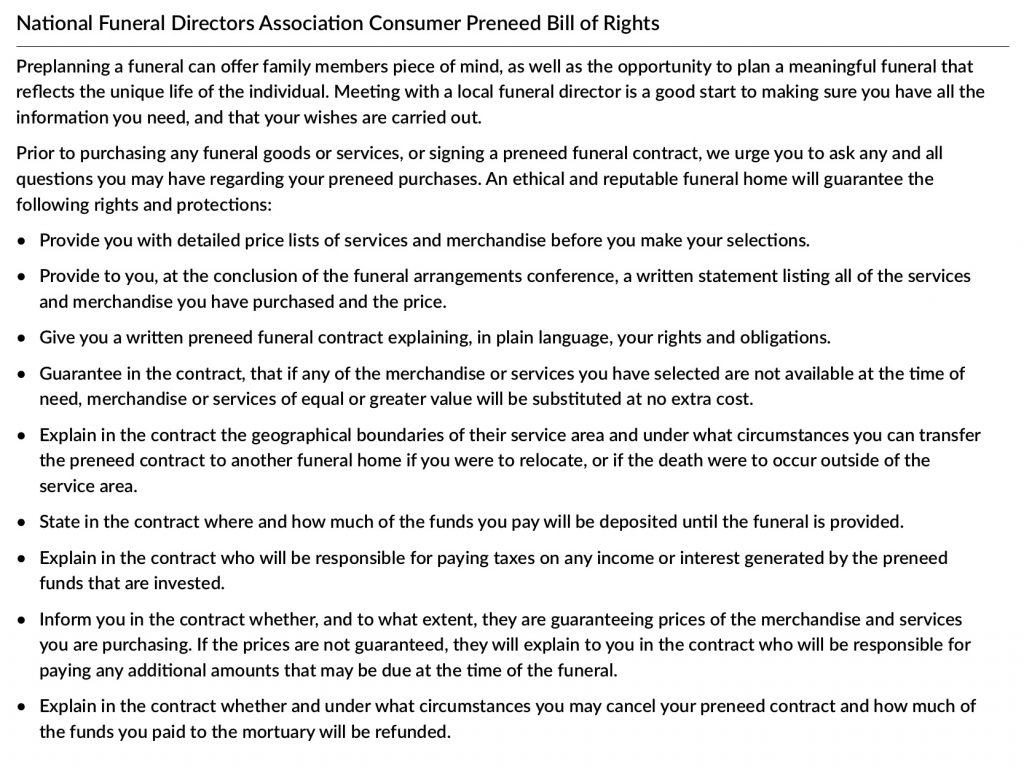
Source – Using End-of-Life Services. National Care Planning Council.
Reference – Bill of Rights for Funeral Preplanning. National Funeral Directors Association.
Planning Services and Ceremonies
There are a number of steps to take when scheduling services and ceremonies. If you have not already done so, begin with these steps:
- Research, visit, and choose the facilities;
- Talk to all involved;
- Prepare for your meeting with the funeral director who will have the most details to go over and decisions for you to make;
- The most important decisions are if your loved one’s body will be embalmed and the choice of casket or an urn if you opt for cremation;
- In the case of embalming and caskets, there may be rules or laws in your state to be aware of.
- In some respects, these may be financial decisions.
- Order a casket and/or urn if you don’t plan on getting them from the funeral home;
- Determine the location of the burial site;
- Ask for help from family or friends for any items needed for the funeral or viewing; and/or
- Arrange care for very young children or pets during the ceremonies.
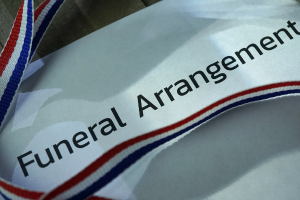 When making any plans it will be important to consider any requests or preferences your loved one made known.
When making any plans it will be important to consider any requests or preferences your loved one made known.
- You may know of their wishes from family discussions.
- There may be written instructions in their will, advance directives, or other document you may need to search for. More than half of the states do not require these instructions to be followed.
- Their preferences may be found in a Disposition of Remains Form, which is allowed in many states. This form can be used to specifically list your loved one’s preferences for after they die and who is authorized to approve a cremation.
- The task of deciding what to do may sometimes fall on you.
- Without specific instructions, you can either make a decision based on what you think they wanted or what you would prefer.
- If you disagree with the choices your loved one has documented and your state does not require you to honor it, you can elect to do what you would prefer.,
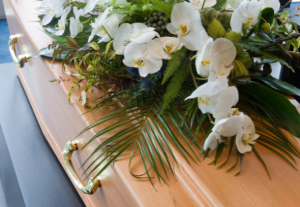 Once you have chosen a venue for each event, you should talk with those who will determine the schedules such as the funeral director and clergy. The timing of the viewing and funeral or memorial service will usually be based on availability and be mostly out of your control.
Once you have chosen a venue for each event, you should talk with those who will determine the schedules such as the funeral director and clergy. The timing of the viewing and funeral or memorial service will usually be based on availability and be mostly out of your control.
There are personal tasks to consider and prepare for, such as deciding what you and/or your children will wear or collecting photographs of your loved one or other meaningful possessions for any services.
Other important considerations.
- Determining what you can afford and sticking to your budget.
- Practical concerns such as availability, timing, convenience, transportation, and amount of time and effort involved.
- Ensuring family needs are met.
- Consulting with all others who will be involved in any of the ceremonies and services about what role they will have. Many of them will involve family and friends.
- Adhering to religious or cultural practices when they are important to you and your family.
- Checking the capacity of each venue and any COVID-19 restrictions before you decide on who may attend.
- If the location of your loved one’s death was far from home, you will need to make arrangements to transport them.
- You will usually be able to find a funeral director in the place your loved one died who will work with a funeral director near your home to make transportation arrangements.
- If you are planning a cremation followed by a memorial service at a later time, you could opt to have your loved one cremated closer to where they died and have the cremated remains shipped home.
- Check all state and local laws before making any final decisions.
- Finally, order printed materials and flowers.
- If you want programs, prayer cards, flowers or other items at the service, order them a few days in advance.
- You can often order them directly through the funeral home, which will minimize coordination on your part, but you’ll often be able to find a better deal by shopping around.
A website, such as Ever Loved can help organize the details. The National Home Funeral Alliance can provide help if you want to have their funeral in your home. A How-to Guide for Making Funeral Arrangements from Funeral Wise and Checklist: Pre-Planning Your Funeral or Memorial Service from everplans are also helpful.
Be sure to record everything, since concentration and memory may be affected by grief and stress.
Choosing a casket
- The intended purposes of a casket are to provide a setting for people to see your loved one, a dignified way to move their body before burial or cremation, and a vessel to bury or cremate them in.
- A casket often accounts for much of the cost after your loved one’s death and can range from $500 to $20,000 or more.
- Burial caskets are not intended to preserve your loved one’s body.
- Cremation caskets are ultimately meant to be destroyed during the process of cremation.
- Federal law requires funeral homes to accept a casket that you may have purchased from another source, such as an online retailer. Some states may allow you or someone else to build your casket.
Choosing an Urn

- An urn is a container that holds cremated remains. Like caskets, urns come in many different materials and decorations. Typically the type of urn will depend on what you plan to do with the ashes.
- If you or someone else plans to keep or place your loved one’s ashes in a columbarium or memorial garden you would likely opt for a decorative and durable urn.
- You may opt for a less decorative urn if you plan to bury their cremated remains.
- You may opt for a non-decorative and less durable scattering urn to hold their ashes before they are scattered on land or sea.
 You will likely be at your most vulnerable after the death of your loved one and unethical people may try to take advantage of this. While it is normal for funeral directors to offer additional services, you should look for another provider if you feel at all pressured or shamed to do more than you have planned for.
You will likely be at your most vulnerable after the death of your loved one and unethical people may try to take advantage of this. While it is normal for funeral directors to offer additional services, you should look for another provider if you feel at all pressured or shamed to do more than you have planned for.
There are ways to reduce the risk of this happening.
- Learn everything you can about your choices before meeting, including laws about caskets, embalming, and burials.
- Make choices as early as possible to avoid being tempted by services or items that you neither want or need.
- Ask for an itemized breakdown of every line item for funeral home costs for comparison, which is your right.
- Don’t agree to a package unless it is obviously less expensive than the total of everything you need.
- Don’t fall victim to emotional appeals for add-ons or packages that allegedly show more respect for your loved one or make them more comfortable.
- Bring others with you for support, help in making good decisions, asking the right questions, and remembering the plans.
When planning, it is important to know that you are protected by the Federal Funeral Rule, which is enforced by the Federal Trade Commission.
The Federal Funeral Rule outlines your rights concerning interactions with funeral homes and requires funeral homes to supply you with certain information and grants you rights to a number of options that you can choose or refuse.
This information includes:
- A copy of an itemized breakdown of every line item for funeral home costs.
- Price information over the telephone without having to give them your name, address, or telephone number. Does not apply to their website or outside vendors.
- A detailed casket price list with all of the options, before you see the actual caskets. This allows you to ask about lower-priced products without unnecessary features that may not be on display. They are obligated to make it available to you if they have it.
- A detailed list of outer burial containers and their prices, if the funeral home sells them.
- A copy of your receipt or a printed statement of exactly what you are buying and the cost of each fee, item, and service after you decide what you want, and before you pay.
- A printed explanation from the funeral home describing any legal funeral, cemetery, or crematory items or services that you will be required to have, such as embalming or outer burial container.
- Do not deal with any person that can’t guarantee they will follow these rules. Although most funeral homes will give you this guarantee, almost one quarter of them are not complying completely with the Funeral Rule.
- Remember that you can cancel the contract for funeral goods and services or transfer them at any time.
- Consider moving on to another facility if you feel at all pressured or made to question your decisions.
- You can always file a complaint against the funeral home.
- Unfortunately, these rules do not apply to non-funeral home vendors and cemeteries.
While not technically fraud, the most commonly encountered ploy is various forms of sales pressure to convince grieving family members to purchase unnecessary or more expensive items and services or expensive packages to prove their devotion to their loved one.
Some of the sales tactics may include:
- Over-the-top emphasis or emotional appeals to ensure the dignity or comfort of your loved one;
- Only displaying expensive caskets, unlisted prices, and misrepresentation of prices;
- Giving you the required information, but along with so much other pricing information that it’s difficult to find the relevant prices;
- Raising the basic-services fee when you buy items from another vendor; and/or
- Offering “very special” services and items like releasing doves, pendants for ashes, protective amulets, and fancy decorations.
- See CBS Canada reports on Funeral home markups and upselling and Funeral home sales tactics.
The funeral home must grant you the following rights:
- To allow you to refuse embalming, unless situations require it and they give proof.
- Embalming is a process where blood is drained from the body and replaced with fluids that temporarily preserve a body. It is done by the funeral home or mortuary and cannot be done without permission.
- Although it is still frequently done, it may not be necessary if the visitation and funeral take place within 3-7 days of death, the funeral home has refrigeration facilities, and you are having a private ceremony.
- Embalming will improve the cosmetic appearance of your loved one’s body to make them more “life-like.” This is usually accompanied by cosmetic restoration.
- Many states have specific rules about embalming, but there are a limited number of circumstances where embalming is legally required.
- The Funeral Rule requires funeral homes to inform you in writing if some arrangements, such as a funeral or visitation with public viewing, make embalming a practical necessity.
- To choose and pay for only the goods and services you want or need, rather than having to pay for a ‘package.’
- To hear about and offer you options to a casket for cremation.
- To supply your own casket or burial container that you may have purchased from another source. Some states may allow you or someone else to build their casket.
- To be informed of any charges due to markup of previously purchased items or price reductions due to commissions, discounts, or rebates.
Funeral homes are prohibited from claiming that the burial container will prevent water, dirt, or other debris from getting into the casket to prevent decomposition. Although there are caskets that will reduce this, they are unnecessary and only delay decomposition.
Services and Ceremonies
 There are different options for honoring and celebrating the life of your loved one, any or all of which can take place. Each event should be personal and reflect your loved one’s personality and beliefs. Even the location of the celebrations can be personal.
There are different options for honoring and celebrating the life of your loved one, any or all of which can take place. Each event should be personal and reflect your loved one’s personality and beliefs. Even the location of the celebrations can be personal.
Viewings and Visitations
A visitation is an informal gathering of family, friends, and well-wishers to offer sympathy, share grief, and pay last respects to your loved one. They are frequently referred to as a Wake.
- The gathering usually takes place in a funeral home, but can also be in a place of worship or your loved one’s home.
- Your loved one will be present, usually in their open or closed casket, but it may be their cremated remains.
- Consider whether or not to add personal touches such as a memory board, slideshow, video, or other personal memorabilia for the viewing. It is very expensive to have the funeral home provide these.
Funerals
A funeral is a formal ceremony, usually faith or cultural based, that takes place with your loved one’s body before it is buried or cremated. They are occasionally held with cremated remains. Ceremonies range from an intimate ceremony in a funeral home chapel or your loved one’s home to a large gathering open to anyone who knew your loved one. Your loved one’s funeral may be accompanied by mass or other religious service.
Here are some of the many details to think about when planning your loved one’s funeral.
- Contacting the cleric, religious figure, or funeral celebrant who will conduct the funeral or memorial service.
- Arranging for a friend or family member of your loved one to write and deliver a eulogy.
- Asking for any family or friends to do readings, such as poems, prayers, religious passages, or scripture.
- Selecting music for the ceremony and finding people to play music or sing during the ceremony.
- Arranging pallbearers, if the final disposition involves a graveside service.
- Someone to create or design the funeral or memorial service program.
Graveside or Committal Ceremony
 The graveside ceremony is usually brief, takes place at your loved one’s gravesite or place of entombment and typically involves only immediate family or close friends.
The graveside ceremony is usually brief, takes place at your loved one’s gravesite or place of entombment and typically involves only immediate family or close friends.
- It may involve a prayer service led by a cleric or religious leader.
- It usually follows a funeral and/or visitation/viewing.
- It may be a direct burial and the only service for your loved one.
Memorial Service
- A memorial service is a formal or informal ceremony that typically takes place after your loved one’s burial, interment, or cremation and can be held any time or even multiple times after their death.
- It can be a formal service, similar to a funeral in content, in a faith-specific location or an informal service anywhere, even a special or favorite place.
- It can be held soon after their death and be the opportunity for the final goodbye or after the feelings of grief have lessened when it can be more of a Celebration of Life.
You can choose a private funeral and have a memorial service for any others that want to honor or celebrate them.
Direct Burial or Cremation
You may prefer not to have a visitation/viewing and funeral service and opt for a direct burial or cremation shortly after your loved one’s death. A funeral home, mortuary, or crematory will be involved to prepare your loved one’s body.
- You will only need the basics: a casket, or an urn for a cremation.
- If this is the only ceremony for your loved one, you may want an elaborate and/or religious service at the gravesite, place of interment, or crematorium chapel. You may have a memorial service at a later date.
Controlling Costs
 Visitations, viewings, funerals, memorial services, and burials can be very expensive, typically between $1,500 and $20,000 depending on the level of services, your choice of casket, the number of ceremonies, venues, available amenities, and where you live. It is important to recognize that funeral homes, mortuaries, and crematoriums are all businesses and strive to make a profit in order to operate. You should be as wary of the directors as you would be of any salesperson.
Visitations, viewings, funerals, memorial services, and burials can be very expensive, typically between $1,500 and $20,000 depending on the level of services, your choice of casket, the number of ceremonies, venues, available amenities, and where you live. It is important to recognize that funeral homes, mortuaries, and crematoriums are all businesses and strive to make a profit in order to operate. You should be as wary of the directors as you would be of any salesperson.
It is not uncommon for these expenses to result in unpayable debt and even bankruptcy, so trying to save on cost and figuring out how to pay for them may be vital to you and your family.
This section will run down the costs and provide some hints on how to control them.
- While about 70% of these costs are typically paid with life insurance settlements, there are ways to make sure that money is available and other ways to pay for them, including prepayment and planning ahead.
- Your loved one’s unshared or personal assets are frozen between their death and the settling of the estate during which time you will need money from other sources to pay these expenses.
- For details see Average 2023 Funeral Costs: Complete Pricing Breakdown & Saving Options
Running Up the Tab
When you have a visitation, viewing, funeral, and/or memorial service there are several expenses that add up quickly.
- While the typical costs can total between $1,500 and $25,000, the average cost of a funeral plus burial is $10,500-$15,000. An average cremation and service is slightly less expensive at about $6,450.
- Costs may include a rental fee for the facility, service fees for funeral staff, the casket and/or urns, costs to transfer your loved one’s remains between each location, burial containers, amenities, such as flowers, slide shows, and limousines, and the cost of gatherings.
You will be paying for burial plots or mausoleums, and markers or headstones separately.
Individual costs
Estimated costs listed are average prices and there will be places where the costs exceed the ranges below.
Embalming is done by the funeral home or mortuary and typically costs between $200-$1,200, although costs up to $1,700 have been reported.
- Beyond the specific circumstances listed previously, embalming is not required by any state law. However, 37 states require funeral rooms to maintain an embalming room.
- In many cases it is an expense that can be avoided. The Federal Funeral Rule allows you to refuse embalming, unless situations require it.
- The embalming fee does not include related tasks, such as $95-$400 (average $250) for washing, dressing, cosmetically preparing your loved one’s body, and placing them in the casket.
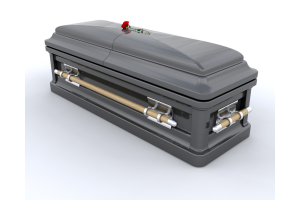 A casket often accounts for much of the cost after your loved one’s death. They can range from a simple $500 box to $20,000 or more, depending on the materials and design. Remember you are primarily paying for the appearance. It is not uncommon for you to be shown only the most expensive caskets, including many with superfluous features, so don’t hesitate to ask to see others.
A casket often accounts for much of the cost after your loved one’s death. They can range from a simple $500 box to $20,000 or more, depending on the materials and design. Remember you are primarily paying for the appearance. It is not uncommon for you to be shown only the most expensive caskets, including many with superfluous features, so don’t hesitate to ask to see others.
As a burial vessel, caskets are not intended to, nor can they, preserve your loved one’s remains. While many casket features may delay decomposition, there is really no reason to do so. It may be unnecessary to pay extra for thicker metal caskets, caskets made out of harder woods, “gasketed,” “protective” or “sealer” caskets to delay the penetration of water, or for warranties on how long a casket will last.
As a cremation vessel, the casket will be destroyed by the heat and fire, and therefore should not be expensive. These caskets may be made of unfinished wood, pressed wood, fiberboard, or even cardboard or canvas with an average cost of $1,000. Alternatives are to rent a casket for presentation and purchase a much less expensive one for cremation or opt for a direct cremation (no visitation and/or funeral) and forgo a casket altogether.
An urn is a container that holds cremated remains. They come in many different materials at various costs, some as low as $100.
- Typically the type of urn will depend on what you plan to do with the ashes.
- If you plan on keeping their ashes, the decision is usually one of appearance and durability.
The average cremation cost is between $1,000 to $3,000 (average $2,183) without basic service fees. With a funeral service and viewing the total cost averages $6,970.
Although the casket may be a major expense, the number of services/ceremonies affects the cost. Expenses usually include rental fees for each facility you are using, costs of all the necessary staff and equipment, and transporting your loved one’s remains. The average fee is $325-350 per transport, plus a rental fee of $350 if you want to use a hearse in the procession. The cost of a vehicle, such as a limo, to transport family members averages $150.
There are many costs associated with burial or interment as well. Unlike funeral homes, cemeteries are not bound by the Funeral Rule.
- A mausoleum or crypt can cost $4,500-$8,500.
- Public cemetery plots typically cost $700-$2,000, while private cemetery plots are $2,000-$5,000. This does not include the land, just the license to be buried or interred there.
- Digging and filling the grave (opening and closing) can cost $1000-$1500. This price may include obtaining necessary permits, maintaining legal files, keeping records, the use of a casket-lowering device, and other items or services.
Burial containers are placed in the grave before your loved one’s burial and the casket is lowered into it. They are there to prevent the grave from caving in or sinking.
- Grave liners are usually concrete and go over the top and protect the sides of the casket.
- A burial vault is more expensive and also supports the casket. They are also usually concrete, although another more durable material may be used. They may be sold with a warranty of protective strength, but that only applies to the grave.
- A burial vault typically costs $900-$13,000, while a grave liner may be $700-$1000.
A typical flat grave marker is $1,000, a simple headstone is typically $1,000-$3,000, and an upright headstone can be upwards of $10,000, depending how elaborate the design is. The price may or may not include the cost of installation.
- Unlike other items, you can take your time choosing grave marker/headstones. Many families take months to do so.
- See How to choose a memorial monument (headstone).
Perpetual or endowment care fees for the gravesite are typically 5% to 15% of the plot price. This is a one-time fee that does not include maintenance of headstones or other gravesite memorials.
Cutting Corners
It will not dishonor your loved one if you consider cost when scheduling events. In fact, they most likely would have been glad that you have not bankrupted yourself or unnecessarily reduced their beneficiaries’ inheritance.
 It is important to try and minimize the cost by finding out what your options are, how much they will cost, and avoiding emotional overspending. Funeral home prices are available by telephone without having to give your name, address, or telephone number. However, they are not required to put their prices on their website. If there is no reason to choose a particular cemetery, such as proximity to mourners or family members interred together, comparison shop for burial sites as well.
It is important to try and minimize the cost by finding out what your options are, how much they will cost, and avoiding emotional overspending. Funeral home prices are available by telephone without having to give your name, address, or telephone number. However, they are not required to put their prices on their website. If there is no reason to choose a particular cemetery, such as proximity to mourners or family members interred together, comparison shop for burial sites as well.
While you can’t change how much these things cost in your area, there are some measures you may consider to reduce your costs. The Funeral Consumers Alliance website may be able help you make choices about more affordable funeral-related costs.
- While you may admit you are on a limited budget, don’t disclose an amount. If you do, you may be surprised how close that number will come to the final price — usually just over it.
- Try to negotiate prices.
- Bring someone with you that will be more objective and help you avoid emotional appeals and other pressures to add unnecessary items and services.
- Although cost will probably not affect this decision, the average cremation and memorial service is slightly less expensive than a funeral service and burial.
- The average cost of a cremation is reported to be $2,000-$4,000. An average of $6,970 if a funeral or memorial service is held.
- The average cost of a funeral and burial has been reported to be between $7,000-$12,500.
- Location-specific costs can be found at How Much Does A Funeral Cost In 2023?
- Refuse embalming, unless the funeral home provides documentation that it is legally necessary. However, embalming may be required by the funeral home for a public viewing.
- Provide clothes for your loved one’s visitation.
- To reduce facility fees, you may want to combine, simplify, or limit the size and length of ceremonies.
- Hold ceremonies in places without venue/facility fees, such as your home or public parks.
- Remember that their casket is merely a means of displaying your loved one’s remains and a burial or cremation vessel.
- Do not pay extra to prevent or slow down decomposition.
- Use outside vendors with lower prices, if allowed in your state.
- If you are concerned about appearances, rent a casket for pre-cremation ceremonies and use an inexpensive option if needed for the cremation.
- If allowed, forgo a casket if your loved one is cremated.
- Contact outside vendors that provide services such as flowers, music, clergy honorarium, and newspaper notifications rather than paying more by having them supplied through the funeral home.
- Save money by not delegating the funeral home to perform tasks that you or the executor can easily do, such as securing the death certificate, submitting obituaries, making claims for Social Security or veterans benefits, or making arrangements for grave markers.
- Opt for a direct cremation through a crematory, which can be one third of the cost of a cremation through a funeral home.
- If you would prefer not to have a viewing or service with the body present, omit all services by electing a direct cremation or immediate burial, which can cost as little as $3,000-$5,000, not including the burial costs.
- If one is required, shop around and choose the least expensive grave insert (burial vault or grave liner).
- Look at options for a burial casket, cremation casket, or funeral urn.
Saving for Expenses
 If you do not want to prepay for funeral and burial (cemetery) or cremation costs, there are many options to save money specifically for these costs. This is necessary since any inheritance from their last will and testament will not be available for some time.
If you do not want to prepay for funeral and burial (cemetery) or cremation costs, there are many options to save money specifically for these costs. This is necessary since any inheritance from their last will and testament will not be available for some time.
- Your loved one can open a dedicated savings account specifically for these expenses and give you shared access to obtain the funds when needed.
- You could use money from your loved one’s life insurance settlement, but only if you are the beneficiary and the funds are transferred to you after their death. About 70% of costs are paid for in this way.
- Your loved one’s life insurance policy could add death benefits that will cover some of the costs.
- Death benefit policies are often expensive, especially if they have pre-existing conditions or other risk factors, such as smoking.
- There may be a waiting period preventing payment if your loved one dies too soon after the benefits were added to the policy.
- If your loved one lives long after the benefits have been added, they could pay more in premiums than the funeral and burial costs.
- Money can be put into a funeral trust with the specific funeral home as the beneficiary.
- The trust accumulates interest, which may account for inflation.
- Items and services are usually prearranged and paid for by the trust after their death.
- If the trust is not enough to cover the cost, you may end up paying additional costs if the agreement did not cover inflation or equivalent substitutes.
- You would not get any excess funds from the trust if it covers more than the funeral costs.
- The trust is forfeit if you cancel the agreement.
- A Totten Trust may be an alternative, where you are the beneficiary. The money is available to you, but you will need to make arrangements for payments, even if you plan the details in advance.
Seeking Financial Assistance
The average funeral or cremation is expensive and can be an enormous burden on many families. While there are ways to save money on a funeral, you may want to consider financial assistance from one or more sources.
- Ask if your immediate family is willing to help with some of the costs.
- Apply for the Social Security burial benefit of $255.
- If your loved one is a veteran, the Veterans Administration (VA) will provide a VA cemetery space at no cost, which includes opening and closing the grave, and a standard marker.
- Crowdfunding campaigns for funerals are increasingly common, and you can set up a free funeral fundraiser on your loved one’s memorial website.
- Help might be available from a number of sources, including a church, union or fraternal organization that your loved one belonged to.
- Websites such as NeedyMeds may be able to locate programs to help with funeral costs or other end-of-life expenses, such as the Funeral Service Foundation – COVID-19 Crisis Response Fund.
Other Things to Do
Perform a thorough check of your loved one’s residence.
- Park vehicles in a secure and legal area and make sure they are locked.
- If their home is vacant, consider notifying the police (dial a non-emergency number), landlord, or property manager to periodically check for evidence of damage or forced entry.
- Throw out any food that will expire, water plants, and look for anything else that may need regular care.
- Put valuables, such as cash, jewelry, and collectible items in a safe place.
- Arrange for landscaping to avoid a sign of the residence being unoccupied.
- Arrange for professional biohazard cleaning if the residence was unattended for an extended time or your loved one’s last days and/or death resulted in bodily fluids accumulating in the home.
- You may want to look for unusual hiding places for money, valuables, and even gold.
If your loved one died in a nursing home, assisted living facility, or hospice facility, remove their personal property from their room.
- There may be restrictions on the amount of time you have to do this.
- There may be substantial charges that you are responsible for after insurance or Medicaid is discontinued following their death.
Organize a post-funeral gathering.
- It can be held at the church, a banquet hall, or private residence.
- Enlist the help of friends and relatives to plan.
- Arrange for food/beverages, whether professionally catered, provided “potluck” by attendees, or arranged by the funeral home or provider.
 Make a list of well-wishers. Keep track of who sends cards, flowers and donations so that you can acknowledge them later.
Make a list of well-wishers. Keep track of who sends cards, flowers and donations so that you can acknowledge them later.
Handle the ethical will, if there is one.
- An ethical will isn’t a legal document, but rather a letter written to your family and friends that shares your values, life lessons, and hopes for the future.
- If the deceased left one, arrange to share it, maybe even have it printed or included in a memorial website.
Make sure you continue to get support after the services and ceremonies.
Finally, remember that this does not end for you after all of the events are over. Going forward, it is important for you to arrange for ongoing contact and support from family and friends.
Resources
- 7 Tips for Buying a Casket Online. Funeral Wise.
- All You Need To Know About Cremation Caskets. everplans.
- All You Need To Know About Headstones And Grave Markers. everplans.
- Amazon Caskets.
- An Overview Of Choosing And Buying Urns. everplans.
- BestPrice Caskets.
- Burial at Sea Reporting System and Reporting Tool: Fact Sheet. United States Environmental Protection Agency.
- Checklist: Pre-Planning Your Funeral or Memorial Service. everplans.
- Checklist of things to consider – Leaving a Legacy – Funeral and Memorial Planning. National Hospice and Palliative Care Organization website.
- Complying With the Funeral Rule. The Federal Trade Commission.
- Costco Caskets.
- Funeral Consumers Alliance.
- Funeral Homes by State. Ever Loved.
- Leaving a Legacy – Funeral and Memorial Planning. National Hospice and Palliative Care Organization.
- Remembering A Life.
- Online Caskets, Urns, Headstones, Cremation Jewelry & Sympathy Gifts. everplans.
- Personal Preference Laws for Body Disposition by State. Funeral Consumers Alliance.
- Saying Goodbye National Hospice and Palliative Care Organization.
- Search for a local Funeral Home. Ever Loved.
- State Requirements for Home Funerals. National Home Funeral Alliance.
- Using End-of-Life Services. National Care Planning Council.
- Who has the legal right to make decisions about your funeral? Funeral Consumers Alliance.
- 5 Types of Funerals: What You Need to Know. Love Lives On website. Accessed: August 18, 2023.
- 8 Ways to Save Money on a Funeral. Ever Loved website. Updated: February 15, 2022. Accessed: August 18, 2023.
- A Guide To Cremation Products. everplans website. Accessed: August 18, 2023.
- Cremation Memorial Options. Cremation Association of North America website. Accessed: August 18, 2023.
- Differences between death notices and obituaries. NewspaperLinks.com website. Accessed: August 18, 2023.
- Disposition of Remains. Gordon Fischer Law website. Posted: February 10, 2020. Accessed: August 18, 2023.
- Funeral Preplanning – Mistakes to Avoid. Boyd Funeral Home website. Published: February 6, 2022. Accessed: August 18, 2023.
- Funeral Scams and Bad Faith Options to Watch Out For. People’s Law website. Updated: January 17, 2022. Accessed: August 18, 2023.
- Garcin J. 19 Ideas to Reduce Funeral or Memorial Service Costs. Cake website. Updated: January 17, 2023. Accessed: August 18, 2023.
- How Much Does It Cost To Be Buried In A Cemetery? everplans website. Accessed: August 18, 2023.
- How To Bury Cremated Remains. everplans website. Accessed: August 18, 2023.
- How To Choose The Right Outer Burial Container: Burial Vaults and Grave Liners. everplans website. Accessed: August 18, 2023.
- Josephson A. How Much Does the Average Funeral Cost? Smartasset website. Updated: March 7, 2023. Accessed: August 18, 2023.
- Kessler C. How to Avoid Being Overcharged for a Funeral. ProPublica website. Posted: September 9, 2022. Accessed: August 18, 2023.
- Kessler S. How Much Does It Really Cost to Embalm a Body? Cake website. Updated: April 23, 2022. Accessed: August 18, 2023.
- Lake R, Gollub H, McGinley. How Much Does A Funeral Cost in 2023? USA Today website. Updated: June 23, 2023. Accessed: August 18, 2023.
- Legal State Requirements for Home Funerals. New Hampshire Funeral Resources, Education & Advocacy website. Posted: November 20, 2020. Accessed: August 18, 2023.
- Martin A. How Much Does A Funeral Cost In 2023? Choice Mutual website. Updated: August 2, 2023. Accessed: August 18, 2023.
- Potts L. Smart Ways to Help You Pay for the Cost of a Funeral. AARP website. Posted: March 18, 2022. Accessed: August 18, 2023.
- Potts L. What to Do When a Loved One Dies. AARP website. Updated: May 24, 2023. Accessed: August 18, 2023.
- Raymond C. How to Plan a Funeral or Memorial Service. verywell healthwebsite. Updated: February 16, 2020. Accessed: August 18, 2023.
- Raymond C. Wake vs. Visitation in a Funeral Service. verywell health website. Reviewed: February 29, 2020. Accessed: August 18, 2023.
- Powsner L. Scattering Ashes: What You Need to Know. Funerals360 website. Posted: January 31, 2018. Accessed: August 18, 2023.
- State Requirements for Home Funerals. National Home Funeral Alliance website. Accessed: August 18, 2023.
- Tanguay J. Embalming: Everything You Need to Know. Cake website. Updated: April 23, 2022. Accessed: August 18, 2023.
- The FTC Funeral Rule. The Federal Trade Commission website. Posted: July 2012. Accessed: August 18, 2023.
- Three Ways Funeral Homes Can Reduce Funeral Costs. Lending USA website. Updated: April 14, 2023. Accessed: August 18, 2023.
- Webster LC. How to Plan Your Funeral Far in Advance. AARP website. Posted: August 13, 2020. Accessed: August 18, 2023.
- What’s The Difference Between An Obituary And A Death Notice. everplans website. Accessed: August 18, 2023.
